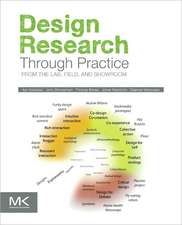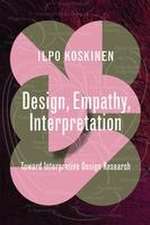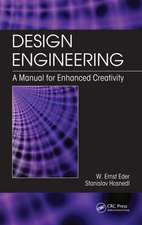Drifting by Intention: Four Epistemic Traditions from within Constructive Design Research: Design Research Foundations
Autor Peter Gall Krogh, Ilpo Koskinenen Limba Engleză Hardback – 12 mar 2020
The authors identify four epistemic traditions in constructive design research. By introducing a Knowledge/Relevance model they clarify how design experiments create knowledge and what kinds of challenges and contributions designers face when drifting. Along the lines of experimental design work the authors identify five main ways in which constructive experiments drift. Only one of them borrows its practices from experimental science, others build on precedents including arts and craft practices. As the book reveals, constructive design research builds on a rich body of research that finds its origins in some of the most important intellectual movements of 20th century. This background further expands constructive design research from a scientific model towards a more welcoming understanding of research and knowledge. This monograph provides novel actionable models for steering and navigating processes of constructive design research. It helps skill the design researcher in participating in the general language games of research and helps the design researcher build research relations beyond the discipline.
| Toate formatele și edițiile | Preț | Express |
|---|---|---|
| Paperback (1) | 690.29 lei 6-8 săpt. | |
| Springer International Publishing – 12 mar 2021 | 690.29 lei 6-8 săpt. | |
| Hardback (1) | 628.17 lei 3-5 săpt. | +18.39 lei 7-13 zile |
| Springer International Publishing – 12 mar 2020 | 628.17 lei 3-5 săpt. | +18.39 lei 7-13 zile |
Preț: 628.17 lei
Preț vechi: 785.21 lei
-20% Nou
Puncte Express: 942
Preț estimativ în valută:
120.20€ • 125.83$ • 99.46£
120.20€ • 125.83$ • 99.46£
Carte disponibilă
Livrare economică 15-29 martie
Livrare express 01-07 martie pentru 28.38 lei
Preluare comenzi: 021 569.72.76
Specificații
ISBN-13: 9783030378950
ISBN-10: 3030378950
Pagini: 146
Ilustrații: XIII, 146 p. 32 illus.
Dimensiuni: 155 x 235 x 18 mm
Greutate: 0.4 kg
Ediția:1st ed. 2020
Editura: Springer International Publishing
Colecția Springer
Seria Design Research Foundations
Locul publicării:Cham, Switzerland
ISBN-10: 3030378950
Pagini: 146
Ilustrații: XIII, 146 p. 32 illus.
Dimensiuni: 155 x 235 x 18 mm
Greutate: 0.4 kg
Ediția:1st ed. 2020
Editura: Springer International Publishing
Colecția Springer
Seria Design Research Foundations
Locul publicării:Cham, Switzerland
Cuprins
Chapter 1. Drifting by intention in design research.- Chapter 2. The shift to knowledge.- Chapter 3. Drifting and knowledge.- Chapter 4. Accountability, reseach and practice.- Chapter 5. From analysis to concept.- Chapter 6. Ways of drifting in design experiments.- Chapter 7. Drifting and evaluation.- Chapter 8. Conceptual scaffoldings.- Chapter 9. New experimentalism in design research.- Chapter 10. Drifting at the frontiers of knowledge.
Notă biografică
Peter Gall Krogh is educated as Architect and Industrial Designer. For more than 20 years he has collaborated with engineers and computer scientists merging technical advancements and artistic concerns in research delivering contribution both in and to design research. As also his industrial career witnesses the work of Peter Gall Krogh has been equally concerned with the object as well as the impact of design research.
Ilpo Koskinen is a former sociologist who has worked in the intersection of product and interaction design for about 20 years. Most of his work has focused on methodological issues in design. He is best known for his work in mobile multimedia, the methodology of design research, and various types of IT concepts.
Ilpo Koskinen is a former sociologist who has worked in the intersection of product and interaction design for about 20 years. Most of his work has focused on methodological issues in design. He is best known for his work in mobile multimedia, the methodology of design research, and various types of IT concepts.
Textul de pe ultima copertă
Constructive design research, is an exploratory endeavor building exemplars, arguments, and evidence. In this monograph, it is shown how acts of designing builds relevance and articulates knowledge in combination. Using design acts to build new knowledge, invite reframing of questions and new perceptions to build up. Respecting the emergence of new knowledge in the process invite change of cause and action. The authors' term for this change is drifting; designers drift; and they drift intentionally, knowing what they do. The book details how drifting is a methodic practice of its own and provides examples of how and where it happens. This volume explores how to do it effectively, and how it depends on the concept of knowledge.
The authors identify four epistemic traditions in constructive design research. By introducing a Knowledge/Relevance model they clarify how design experiments create knowledge and what kinds of challenges and contributions designers face when drifting. Along the lines of experimental design work the authors identify five main ways in which constructive experiments drift. Only one of them borrows its practices from experimental science, others build on precedents including arts and craft practices. As the book reveals, constructive design research builds on a rich body of research that finds its origins in some of the most important intellectual movements of 20th century. This background further expands constructive design research from a scientific model towards a more welcoming understanding of research and knowledge. This monograph provides novel actionable models for steering and navigating processes of constructive design research. It helps skill the design researcher in participating in the general language games of research and helps the design researcher build research relations beyond the discipline.
The authors identify four epistemic traditions in constructive design research. By introducing a Knowledge/Relevance model they clarify how design experiments create knowledge and what kinds of challenges and contributions designers face when drifting. Along the lines of experimental design work the authors identify five main ways in which constructive experiments drift. Only one of them borrows its practices from experimental science, others build on precedents including arts and craft practices. As the book reveals, constructive design research builds on a rich body of research that finds its origins in some of the most important intellectual movements of 20th century. This background further expands constructive design research from a scientific model towards a more welcoming understanding of research and knowledge. This monograph provides novel actionable models for steering and navigating processes of constructive design research. It helps skill the design researcher in participating in the general language games of research and helps the design researcher build research relations beyond the discipline.
Caracteristici
Proposes the concept of "drifting" to the design process Provides unprecedented helpful models for steering and navigating processes of constructive design research Features proven knowledge built on novel, high-acclaimed research results in the field




















